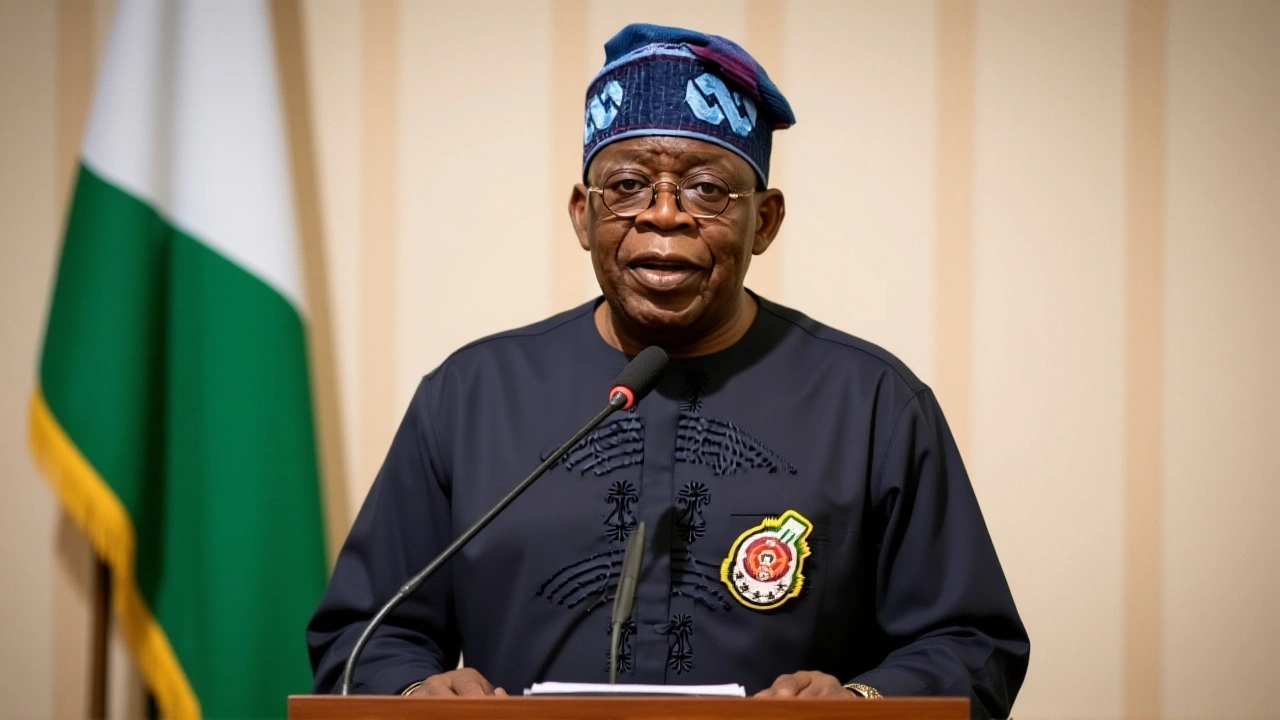When Bola Ahmed Tinubu, President of Nigeria stepped in on April 30, 2024, the fate of the Dangote Petroleum Refinery hung in the balance. The president’s swift mediation halted what the Dangote Group called a "major sabotage attempt" by the Petroleum and Natural Gas Senior Staff Association of Nigeria (PENGASSAN). The dispute threatened to shut down the $20 billion facility, jeopardizing national energy security and shaking investor confidence.
Background to the Dispute
Located in Lagos, the Dangote Petroleum Refinery is the largest single‑investment oil‑processing plant in Africa. Since its commissioning, the refinery has been touted as the cornerstone of President Tinubu’s pledge to achieve fuel self‑sufficiency.
In early April 2024, the refinery’s management dismissed more than 800 contract workers, alleging "acts of sabotage and breaches of internal safety protocols." Aliko Dangote, founder of the Dangote Group, defended the firings as necessary to protect the plant’s operational integrity.
The affected workers, backed by PENGASSAN, claimed the terminations were unjust and demanded reinstatement. The union responded by ordering its members to suspend crude oil and gas deliveries to the refinery, a move that could have crippled the plant’s output for weeks.
Presidential Mediation and Resolution
President Tinubu, acting through the Ministry of Labour and Employment, convened emergency talks on April 28. Within 48 hours, the president’s team secured a provisional agreement that halted the union’s supply stoppage. The deal included a promise to review the dismissed workers’ cases and to set up a joint monitoring committee.
“The prompt intervention of President Bola Tinubu, working through the relevant government agencies, saved the situation from escalating into a full‑blown disruption of critical national infrastructure,” the Dangote Group’s statement read. The National Industrial Court, meanwhile, had issued an interim order on April 27 restraining PENGASSAN from interfering with refinery operations, reinforcing the legal backdrop for the president’s actions.
Union Perspective and Legal Actions
PENGASSAN maintains that the mass dismissals violated collective bargaining rights. In a press briefing on April 29, union spokesperson Adeyemi Olagunju said the workers were being scapegoated for broader supply‑chain issues.
The union’s legal counsel filed a petition with the National Industrial Court, arguing that the interim order was "procedurally flawed" and that the workers deserved immediate reinstatement. While the court’s restraining order remains in place, both sides have agreed to a mediated settlement overseen by the Ministry of Labour.
Reactions from Civil Society and Politicians
Supporters of the refinery rallied in Kaduna on Monday, under the banner of the Partners for National Economic Progress (PANEP). Leaders Igwe Ude‑Umanta and Dahiru Maishanu carried placards reading “Support Local Refining” and “Crush Economic Saboteurs.”
Ude‑Umanta declared, “This is not about Dangote alone; it’s about Nigeria’s economic survival. The president must rise to the occasion and crush those sabotaging our march toward self‑reliance.”
Meanwhile, the Arewa Consultative Forum (ACF) issued a statement warning that any attempt to cripple the refinery would send a "negative message to both domestic and international investors." Senators Adams Oshiomhole and Ali Ndume echoed the sentiment, urging that the facility be treated as a strategic national asset.

Implications for Nigeria’s Energy Future
Analysts say the episode highlights the fragile balance between labour rights and large‑scale industrial projects. Dr. Chinua Okeke, a senior fellow at the Centre for Energy Studies, notes that "without a stable regulatory environment, even the most capital‑intensive ventures risk stalling."
Economically, the refinery is projected to cut fuel imports by $2.5 billion annually once fully operational. The brief shutdown scare reminded investors that political risk remains a key variable.
What Comes Next?
President Tinubu has pledged continued oversight. A joint task force comprising the Ministry of Labour, the Ministry of Petroleum, and representatives from PENGASSAN is slated to meet monthly until the disputed workers’ cases are fully resolved.
Industry insiders expect the refinery to ramp up to 650,000 bpd by the end of 2025, provided labour peace holds. The coming weeks will test whether the government can sustain the diplomatic momentum generated by the April 30 intervention.
Frequently Asked Questions
How does the dispute affect fuel prices for Nigerian consumers?
A prolonged shutdown could have pushed gasoline and diesel prices up by 5‑10 %, as imports would have needed to fill the gap. The quick resolution helped keep prices stable during April, but any future disruptions could still ripple through the market.
What legal avenues does PENGASSAN still have?
The union can continue its case in the National Industrial Court, seeking a ruling that the dismissals violated labour law. It may also appeal to the Federal High Court if it believes the interim order was issued improperly.
Why is the Dangote Petroleum Refinery considered a strategic asset?
At a projected 650,000 bpd capacity, the refinery is expected to meet roughly 70 % of Nigeria’s domestic fuel demand, dramatically reducing reliance on costly imports and enhancing energy security.
What role did the National Industrial Court play?
On April 27, the court issued an interim injunction preventing PENGASSAN from obstructing refinery operations. That order gave the government breathing room to negotiate without the immediate threat of supply stoppage.
Will the dismissed workers be reinstated?
The presidential mediation includes a review panel that will assess each case. Early indications suggest a mixed outcome: some workers may be reinstated, others could receive severance or retraining offers.


Ananth Mohan
Tinubu stepped in at a critical moment and prevented a shutdown that could have cost Nigeria billions. The mediation shows how government can act as a neutral broker when labour and industry clash. It also sends a signal to investors that the state will protect strategic assets. Hopefully this sets a precedent for future disputes.